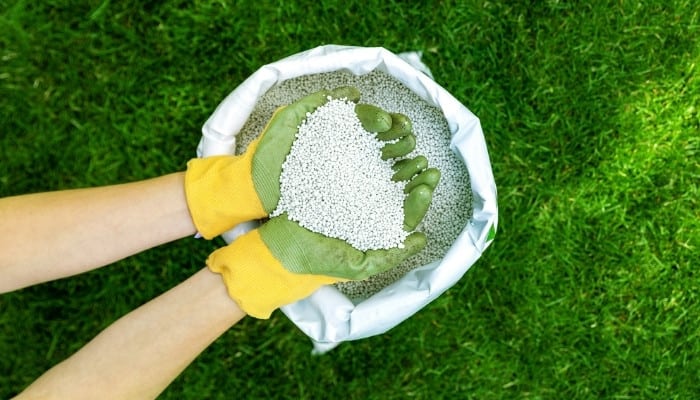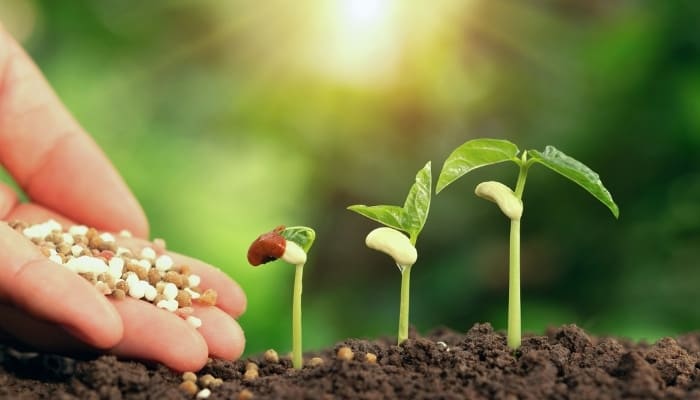Plant food is essential for nourishing your plants and promoting a bountiful harvest at the end of the growing season.
Just because plant food is good for plants, it doesn’t mean that it’s also good for humans or even pets. If anything, it’s the exact opposite.
Is plant food poisonous? If you come in contact with any type of fertilizer or inhale or ingest them, you’re likely to suffer some negative health effects that range from itchy and red skin to trouble breathing, low blood pressure, seizures, upset stomach, and fainting. Compost and other organic fertilizers are packed with pathogens that cause serious diseases.
As you handle plant food on a regular basis, it’s easy to forget that you’re dealing with hazardous chemical products.
Safety precautions should be adhered to from the moment you open the bag of plant food until you seal it shut and store it in a safe place.
Keep reading to learn what kind of hazards plant food poses and how to take precautions.
Toxic Effects of Plant Food
Whether you’re dealing with chemical fertilizers or homemade compost, exposure to the material can pose many health risks.
The main ingredient in plant food that causes the most harm is nitrates.
These nitrogen-based compounds are easy to absorb by the plants, but in the human body, they interfere with the red blood cells’ job of carrying oxygen.
Physical Contact
The most common way to be exposed to the hazards of plant food is by physical contact. This often happens when you handle the fertilizer granules or compost powder with bare hands.
Even if you’re working with liquid fertilizers, there’s a chance the liquid could fall on your skin when mixing in the ingredients or spraying the plant food.
In either case, the symptoms vary from mild to quite severe.
Symptoms
If you don’t wash the plant food off quickly, your skin will start to turn red. Itchiness is a common symptom of many nitrate-based plant foods.
A burning sensation in the affected area is another common symptom after exposure. If the plant food is not diluted and the exposure lasts for a long time, you might develop burning eyes or nose.
Treatment
Plant food poisoning is a serious matter even if the symptoms are mild. You should always seek medical help.
Meanwhile, try to wash the food plant off your skin and place the infected area under cold running water for about 15 minutes to flush out any chemicals on the skin.
Prevention
To prevent plant food poisoning through physical contact, always wear protective gloves when handling the material.
After applying the fertilizer, water the plant immediately to prevent accidental exposure. Always store the fertilizer in a safe place out of reach of children or pets.

Ingestion
Fertilizer poisoning through ingestion is a problem with pets and children more than with adults.
Pets are quite inquisitive and so are children, but adults too can accidentally ingest the material if they forget to wash their hands after handling the food plant.
No matter what type of plant food you’re using or how much has been ingested, the symptoms are often severe.
Symptoms
Once the nitrates in the fertilizer reach the stomach, they are absorbed and make their way to the bloodstream. There, they damage the red cell’s capacity to carry oxygen.
The symptoms include blue fingernails, lips, and hands. Stomach trouble, such as pain in the stomach, nausea, and vomiting, is also quite common.
The patient might also suffer shortness of breath and dizziness, and they might even faint.
Treatment
You should seek medical help immediately. While waiting for help, you can drink water or milk to counter the effects of the poison.
In most cases, you should not induce vomiting unless you’re told to do so by the medical professional you contacted. If you’re vomiting, don’t drink anything since that poses a choking hazard.
Prevention
You should keep plant food out of reach of children and pets, and always wash your hands thoroughly after handling fertilizer.
Water the plants after each plant food application to minimize the risk of someone ingesting the fertilizer.
Inhalation
Anyone dealing with plant foods is at risk of inhaling the fumes or dust of the fertilizer. This often happens in poorly ventilated areas such as basements and greenhouses.
Inhaling the dust of compost is quite risky since it exposes the respiratory system to pathogens and live germs that cause infections and diseases.
Symptoms
The symptoms of inhaling plant food all center around the mouth, nose, and throat areas. These areas often turn red, become itchy, and might lead to difficulty in breathing or shortness of breath. In extreme cases when the patient has inhaled fumes of nitrate-based fertilizers, the lips and fingernails might turn blue.
Treatment
The first thing to do after inhaling plant food is to get fresh air. Move outside, or open a window and stick your nose out.
Breathe in fresh air to flush the toxins out of your respiratory system. If the symptoms persist, you should call the American Association of Poison Control Centers.
Their hotline is 1-800-222-1222, and it works 24/7.
Prevention
Always wear protective gear when working with plant food. Face masks are a must to prevent inhaling the particles of the fertilizer.
Fertilizer Safety
You should treat fertilizers as toxic materials because that’s what they are. Wear protective gear before applying the plant food. This includes gloves, face masks, and eyewear.
Don’t spray the fertilizer on your hands or other surfaces, and give yourself a good cleanup after finishing with the application.
Pets and Fertilizer Safety
Pets like to sample everything they encounter, so don’t leave the bag of fertilizer open where pets might find it. Remember to water the plants after each application.
Related Questions:
Is Lawn Fertilizer Harmful to Dogs?
You should keep your dogs off the lawn while applying the lawn fertilizer. These fertilizers are not pet safe and can cause serious illness in dogs.
Is Organic Fertilizer Toxic?
Organic fertilizers are no less toxic than non-organic ones. Treat them as toxic materials, and apply safety precautions when handling the materials.
Conclusion
Plant food might be necessary for the health of the plants, but it’s a toxic material as far as humans and pets are concerned.
Avoid unneccessary exposure to the fertilizer from physical contact, ingestion, or inhalation, and get medical help immediately if that happens.

